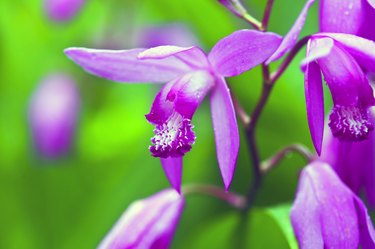
Many gardeners shy away from growing orchids. Orchids have a reputation as high-maintenance greenhouse plants, and many types of orchids do need a bit more coddling than other plant species. However, not all orchids are this finicky. In fact, many gardeners don't even know that they can grow some kinds of orchids in their garden, planted directly in the ground.
Aptly named, a ground orchid (Bletilla striata) is cold-hardy, unlike many of its tropical orchid relatives. Also called hardy orchid or Chinese ground orchid (because of its native habitat origin), this plant is a perennial in U.S. Department of Agriculture plant hardiness zones 5 through 9. If you grow a ground orchid, you'll be treated to some of the same exotic-looking flowers that you recognize on other orchid specimens. But the icing on the cake is that caring for a ground orchid is a snap, even for novice gardeners.
Video of the Day
Video of the Day
Watering and Fertilizing Ground Orchids
Ground orchids grow best in moderately moist soil that drains well. Moist soil doesn't mean soggy or waterlogged, and drainage is a must for healthy growth. It's important to remember that well-draining soil is the most important factor in growing ground orchids successfully. If your garden soil is too water-retentive, you can still grow ground orchids in raised beds or containers.
To nudge many flowering plants into producing flowers, you have to fertilize them on a regular basis. This isn't the case with ground orchids, which actually bloom best without a lot of fertilizer. Fertilize ground orchids only if the soil in your garden is nutrient-poor and then only at one-quarter the rate that you'd give to other flowers. By incorporating compost into the garden soil when you plant ground orchids and by applying more at the beginning of each growing season, you'll supply nutrients in the form of organic matter. This is important for healthy growth but doesn't burn plants with too much fertilizer.
Ground Orchids as Container Plants
Ground orchids are good plants for container gardening. Containers offer the good drainage orchids need, and they're portable, which is a plus for moving them indoors during winter if you live outside this plant's hardiness zone. You'll also be able to control the growing medium in a container. Choose a rich organic potting mix with added perlite and/or sand to create top-notch drainage.
Because ground orchids have shallow roots, the width of a container is more a consideration than the depth. For example, you can choose a bowl-shaped planter (with a drainage hole) that is wider than it is deep. This width will also accommodate the future growth of ground orchids, which spread by producing rhizomes (modified horizontal stems). Place the container in a partial-shade location that's protected from the afternoon sun and be sure to keep the soil moderately moist.
Potential Problems of Ground Orchids
A primary problem of ground orchids is root rot. Once this fungal disease takes hold, you may not be able to save your plants. But you can prevent the problem altogether by growing your plants either on garden soil that drains well or in raised beds or containers. Also, if you divide a clump of ground orchids, be sure that you avoid planting the divisions too deep, which can cause the crown to rot.
Slugs and snails may be occasional pests. If too many of these little visitors find your ground orchids irresistible, you can use a commercial slug trap, or you can make your own:
- Dissolve 3 teaspoons of yeast in 1 cup of warm water and pour the mixture into a small container.
- Bury the container in the soil around your ground orchids and leave 1 to 2 inches of the container aboveground to keep out beneficial bugs and insects.